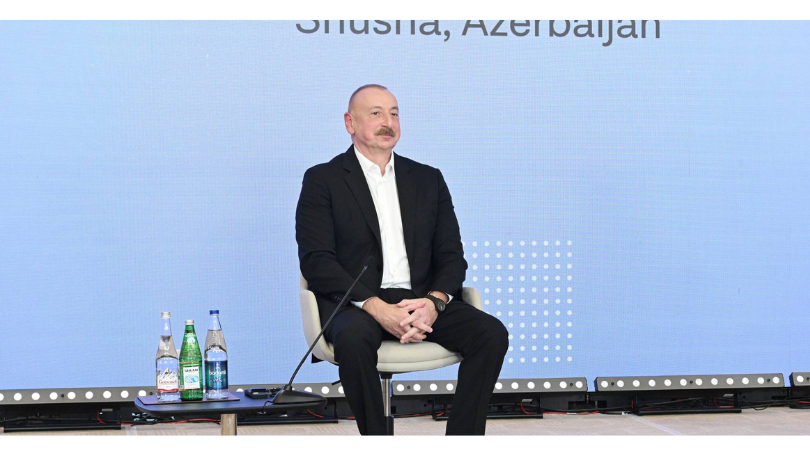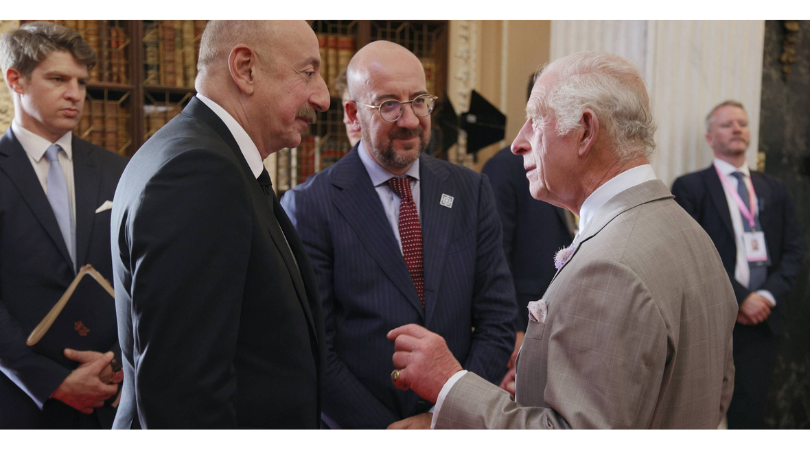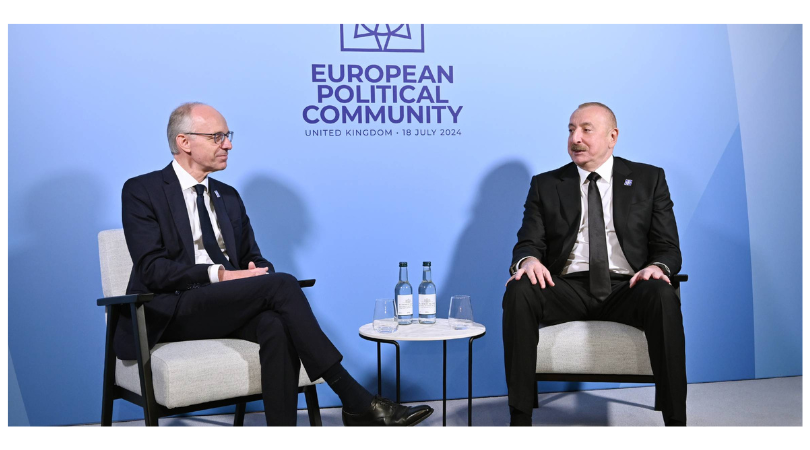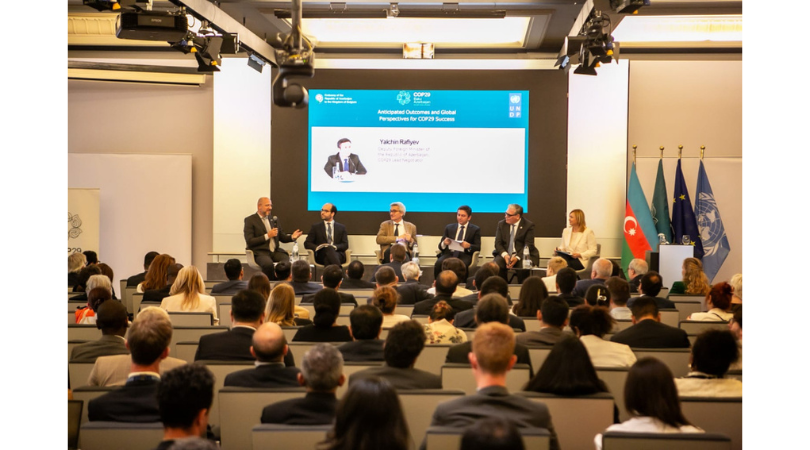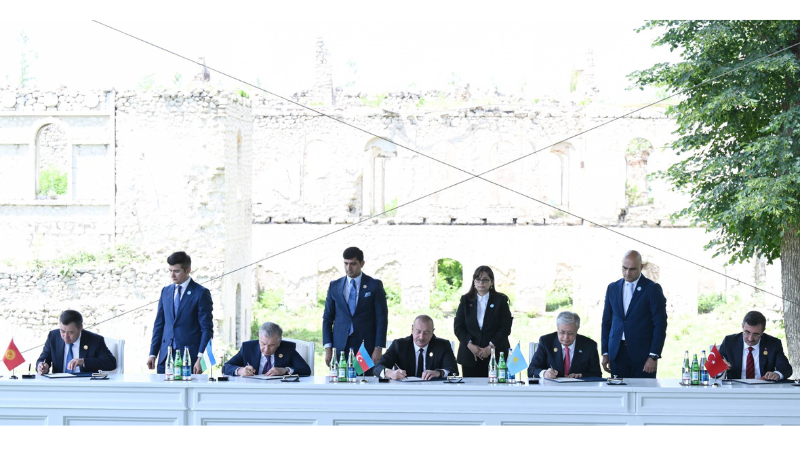EXPLANATORY INFORMATION - ARMENIAN DETAINEES IN AZERBAIJAN
ARMENIAN DETAINEES IN AZERBAIJAN
Armenia’s request that Azerbaijan “release immediately” all Armenian detainees in its custody does not engage plausible rights and that is for two reasons. First, these individuals are not being detained “based on” their national or ethnic origin. Of course, if Azerbaijan is engaged in a conflict with a wholly ethnically Armenian force, the detainees it holds are likely to be ethnically Armenian. But that is not evidence of racial discrimination. Second, their detention is lawful under both international and domestic law and thus has neither the purpose nor the effect of impairing the detainees’ equal enjoyment of fundamental human rights.
In fact, Azerbaijan released or repatriated the vast majority of Armenians in relation to the hostilities last autumn, in a variety of circumstances. For instance, in the last few months, eight Armenian detainees were released following investigation, on the basis that they had committed no crimes[1]. This was not pursuant to a bargain with Armenia. This shows that Azerbaijan investigated in each case whether there is a basis for continued detention. Other detainees were released as part of exchanges, including for landmine maps which Azerbaijan acutely needed to protect its people from serious harm and which Armenia continuously refused to provide. For example, in the last release, it was Armenia who used detainees as bargaining chips, refusing to hand over landmine maps unless some detainees were released. It is outrageous, we suggest, for Armenia to suggest that Azerbaijan should not have released detainees and instead allow its citizens to continue to be blown up by unexploded landmines laid by Armenia during its 30-year occupation of Azerbaijan’s sovereign territory. Azerbaijan has detained individuals who have been charged or convicted of torture, murder, mercenarism and other serious crimes. Azerbaijan has rights and obligations to investigate and prosecute these offences under the Geneva Conventions and generally under international and domestic law.
The individuals currently detained by Azerbaijan on this basis include, for example:
- Two Armenian nationals, who are serving 20-year sentences for, among other crimes, torturing, killing and holding hostage various Azerbaijani civilians and soldiers between 1991 and 2020[2]. Numerous victims described routine and brutal beatings at the hands of these two Armenian For example, Azerbaijani soldiers and civilians testified to being beaten with the butt and barrel of machine guns and pieces of wood, or being nearly drowned, doused with gasoline or deprived of food and water.
- Number 1 on the list, a Lebanese national, who participated in attacks against Azerbaijani civilians and soldiers during the conflict between Armenia and Azerbaijan in exchange for material compensation[3]. That individual was sentenced to 20 years in prison for mercenarism and terrorism, among other
Secondly, these detentions have proper legal basis, and do not therefore impair the detainees’ human rights. Even if the detainees were prisoners of war — and that actually does not matter at this stage — Article 119 (5) of the Third Geneva Convention is clear: “Prisoners of war against whom criminal proceedings for an indictable offence are pending may be detained until the end of such proceedings, and, if necessary, until the completion of the punishment”.
Armenia’s contention that the detainees are being prosecuted on “fabricated charges” is unsubstantiated and false. At least, there is no dispute that these individuals entered the territory of Azerbaijan weeks after the cessation of hostilities, and Azerbaijan detained them because they were suspected of being involved in attacks on Azerbaijani civilians and servicemen, resulting in four deaths[4]. It is entirely within Azerbaijan’s sovereign prerogative to prosecute those crimes under its laws.
In addition, as the evidence adduced by Azerbaijan demonstrates, each convicted individual was tried and sentenced by regularly constituted courts, in accordance with due process requirements in accordance with Azerbaijan’s international obligations.
Azerbaijani law requires that all accused — regardless of their national or ethnic origin — be treated equally before the courts, and in accordance with international standards. The rights involved include the right:
- to be informed of the nature of the charges against him, without delay and in a language that he understands[5];
- to have the assistance of counsel[6];
- to be presumed innocent until proven guilty[7];
- to be tried by an independent and impartial court or tribunal[8];
- to be tried in public[9]and without undue delay[10];
- to examine witnesses[11] and be present at the trial[12];
- not to be compelled to testify against himself or to confess guilt[13]; and
- to have the right to appeal any decision against him[14]
The detainees currently serving a custodial sentence were convicted based on an independent evaluation of the evidence. That is shown by the fact, in many cases, the initial charges were reduced or dropped where the judges determined the evidence was insufficient to support them[15]. For example, on 2 July 2021 the Baku Court on Grave Crimes refused to uphold charges against 14 detainees for terrorism or illegal possession of firearms due to lack of evidence, and found that only charges concerning illegal crossing of the border were established[16].
These trials were held in open court. The hearings were broadcast via video stream which was accessible to the public; and representatives of the International Committee of the Red Cross (“ICRC”), the diplomatic corps, the Azerbaijani Ombudsman and the international media were present.
In summary, Azerbaijan is not wantonly detaining or prosecuting Armenians based on racial animus. It does so based on the merit of each individual criminal allegation[17]. Armenia can establish no impairment of human rights or unlawful discrimination.
There is no rule of international law which allows Armenia to Armenia’s demand release of individuals who are being lawfully detained and tried for grave criminal offences. Armenia’s request seeks to establish a de facto régime of immunity for its nationals, which finds no support in the CERD or general international law.
Further, by requesting that Azerbaijan “release immediately all Armenian . . . detainees in its custody”, the requested measure overreaches. It takes no account of whether Azerbaijan has a lawful basis for their detention. It is an abuse, moreover, of the provisional measures régime, because it calls for an irreversible measure that would irreparably prejudice Azerbaijan’s rights to see its laws observed and obeyed, and crimes against it and its people punished.
Similar requests for the release of criminal detainees have been rejected by international courts and tribunals.
In the case of The “Enrica Lexie” Incident (Italy v. India), the UNCLOS Tribunal refused a request by Italy that it order India to release detainees who were subject to criminal proceedings in India[18]. As Judge Paik explained in his separate declaration:
“[The] [e]xercise of criminal jurisdiction is a duty of the [Court]. It is indispensable to the maintenance of law and order, a fundamental basis of any society, which no State can take lightly if it is not to neglect its duty as a State. In exercising criminal jurisdiction, obtaining the custody of the accused is crucial. . . . [R]equiring India virtually to ‘hand over’ the accused to Italy goes beyond the function of provisional measures as interim relief and comes close to prejudging the merits of the dispute.”[19]
Similarly, the European Court of Human Rights rejected as inappropriate Armenia’s previous request to them for interim measures seeking the release of the detainees held by Azerbaijan, noting that: “there exist other international mechanisms which are better placed for continuous monitoring of the conditions of detention of people captured during armed conflicts”[20]. The European Court of Human Rights found that non-judicial monitoring — by institutions like the ICRC — was the appropriate mechanism; not the release of the detainees. As pointed out in Italy v. India, an order for release “goes beyond the function of provisional measures [on] interim relief”[21].
Conversely, the measures requested by Armenia would risk prejudice to Azerbaijanis’ rights. Azerbaijan is obliged under the CERD to provide effective protection and remedies against acts of racial discrimination, and that includes an obligation to investigate and
prosecute acts of racial discrimination[22]. Certain of the detainees committed ethnically motivated crimes against Azerbaijanis[23], which Azerbaijan is required to investigate and prosecute under international law. The right of Azerbaijani victims to a remedy would be nullified if their torturers were simply allowed to walk free.
Fundamentally, Azerbaijan has demonstrated through its actions that it does not condone torture or mistreatment of any kind, regardless of a detainee’s origin. This is in stark contrast to Armenia’s position. Azerbaijan and the international community have repeatedly called on Armenia to abide by its CERD obligations to investigate and prosecute the numerous credible reports of torture or mistreatment perpetrated by Armenian forces against Azerbaijanis both during the First and the Second Garabagh War[24]. Armenia has remained silent on this issue, and has not publicly confirmed that it has taken any action to address these grave allegations.
There is no evidence of imminent risk of irreparable prejudice to the rights of detainees presently in custody. There are several protections in place to ensure that remains the case. The ICRC has access to all of the detainees, and it has confirmed that it “visits individuals detained in relation to the Nagorno-Karabakh conflict on a regular basis . . . [and] assess[es] their treatment and conditions of detention and facilitate their contact with the families”[25].
In addition, the Azerbaijani ombudsperson pays regular ad hoc visits to detainees without prior notification[26]. The ombudsperson has reported that she visited the Armenian detainees on 16 May 2021 and explained her mandate to them, speaking through an Armenian interpreter. She handed out the text of the European Convention on Human Rights in the detainees’ native language, explained the detainees’ rights to them and gave the detainees the telephone number of the call centre of the Ombudsman Institution which functions 24 hours a day.
During her visit, the ombudsperson examined the general treatment of the detainees, who confirmed that they were provided with adequate food, both in quantity and nutritional value, had access to clean drinking water, and were able to speak with their relatives. They also reported that ICRC representatives had visited them.
What is more, detainees were also visited by the National Preventive Group’s doctor, who accompanied the ombudsperson, and provided medical examinations at the request of the detainees. All detainees have access to routine and urgent medical care as needed. As the European Court of Human Rights has rightly indicated, these are the forms of protections that are appropriate in the circumstances of the case.
[1] “Azerbaijan detains and later releases another Armenian soldier for crossing the border”, JAM News (8 June 2021), available at https://jam-news.net/azerbaijan-detains-another-armenian-soldier-for-crossing-the-border/; “Azerbaijan returns missing Armenian serviceman back to home country”, News.AZ (6 Oct. 2020), available at https://www.news.az/news/azerbaijan-returns-missing-armenian-serviceman-back-to-home-country.
[2] Judgment on Behalf of the Republic of Azerbaijan, Baku Military Court, Case No. 1–1(093)–104/2021 (2 Aug. 2021).
[3] Judgment on Behalf of the Republic of Azerbaijan, Baku Military Court, Case No. l–l(093)–94/2021 (14 June 2021)
[4] https://mfa.gov.az/en/news/no17221-head-of-the-press-service-department-of-the-mfa-of-azerbaijan-leyla-abdullayeva- answers-the-question-of-the-media.
[5] Criminal Procedure Code of the Republic of Azerbaijan (CPC), Art. 14 (4).
[6] CPC, Art. 19.
[7] Constitution of the Republic of Azerbaijan, Art. 63., CPC, Art. 21 (1)
[8] CPC, Art. 25.
[9] CPC, Art. 27.
[10] CPC, Arts. 22, 48.
[11] CPC, Art. 19 (4) (5).
[12] CPC, Art. 27 (2).
[13] Constitution of the Republic of Azerbaijan, Art. 66, CPC, Art. 20.
[14] CPC, Art. 91 (5) (31).
[15] Judgment on Behalf of the Republic of Azerbaijan, Baku Court on Grave Crimes, Case No. 1(101)–1204/2021 (2 July 2021); Judgment on Behalf of the Republic of Azerbaijan, Baku Court on Grave Crimes, Case No. 1(101)–1242/2021 (22 July 2021) Judgment on Behalf of the Republic of Azerbaijan, Baku Court on Grave Crimes, Case No. 1(101)– 1256/2021 (23 July 2021); Judgment on Behalf of the Republic of Azerbaijan, Baku Court on Grave Crimes, Case No. 1(101)–1258/2021 (29 July 2021); Judgment on Behalf of the Republic of Azerbaijan, Baku Military Court, Case No. 1–1(093)–104/2021 (2 August 2021).
[16] Judgment on Behalf of the Republic of Azerbaijan, Baku Court on Grave Crimes, Case No. 1(101)–1204/2021 (2 July 2021); Judgment on Behalf of the Republic of Azerbaijan, Baku Court on Grave Crimes, Case No. 1(101)–1242/2021 (22 July 2021); Judgment on Behalf of the Republic of Azerbaijan, Baku Court on Grave Crimes, Case No. 1(101)– 1256/2021 (23 July 2021); Judgment on Behalf of the Republic of Azerbaijan, Baku Court on Grave Crimes, Case No. 1(101)–1258/2021 (29 July 2021).
[17] See e.g. “Azerbaijan detains and later releases another Armenian soldier for crossing the border”, JAM News (8 June 2021), available at https://jam-news.net/azerbaijan-detains-another-armenian-soldier-for-crossing-the-border/; “Azerbaijan returns missing Armenian serviceman back to home country”, News.AZ (6 October 2020), available at https://www.news.az/news/azerbaijan-returns-missing-armenian-serviceman-back-to-home-country.
[18] The “Enrica Lexie” Incident (Italy v. India), Provisional Measures, Order of 24 August 2015, ITLOS Reports 2015, p. 182, paras. 29, 141.
[19] The “Enrica Lexie” Incident (Italy v. India), Provisional Measures, Order of 24 August 2015, ITLOS Reports 2015, p. 182, declaration of Judge Paik, para. 6.
[20] Armenia v. Azerbaijan, ECHR, Application No. 42521/20, Letter ECHR–LE2.1aG from Johan Callewaert, Deputy Grand Chamber Registrar, to Mr. Çingiz Əsgǝrov, Agent of the Government of the Republic of Azerbaijan, dated 9 June 2021.
[21] The “Enrica Lexie” Incident (Italy v. India), Provisional Measures, Order of 24 August 2015, ITLOS Reports 2015, p. 182, declaration of Judge Paik, para. 6.
[22] See Salifou Belemvire v. Moldova, Communication No. 57/2015, Opinion, doc. CERD/C/94/D/57/2015 (24 November 2017).
[23] Judgment on Behalf of the Republic of Azerbaijan, Baku Military Court, Case No. 1-1(093)– 104/2021 (2 August 2021)
[24] See e.g. Amnesty International, “Armenia/Azerbaijan: Decapitation and war crimes in gruesome videos must be urgently investigated” (10 December 2020); United Nations Office of the United Nations High Commissioner for Human Rights, “Nagorno-Karabakh conflict: Bachelet warns of possible war crimes as attacks continue in populated areas” (2 November 2020), available at https://www.ohchr.org/EN/NewsEvents/Pages/DisplayNews.aspx?NewsID=26464; Nicola Murray, Deputy Head of the United Kingdom Delegation to the OSCE, “UK statement in response to OSCE Minsk Group Co-Chair statement” (17 December 2020), available at https://www.gov.uk/government/news/uk-statement-in- response-to-osce-minsk-group-co-chair-statement; Human Rights Watch/Helsinki, “Azerbaijan: Seven Years of Conflict in Nagorno-Karabakh” (December 1994), pp. 56-60, 91, 97; Human Rights Watch/Helsinki, “Bloodshed in the Caucasus: Escalation of the Armed Conflict in Nagorno Karabakh” (September 1992), pp. 23–28.
[25] International Committee of the Red Cross, “Nagorno-Karabakh conflict: Offering a lifeline to families of detained people” (24 Aug. 2021), available at https://www.icrc.org/en/document/nagorno-karabakh-conflict- connecting-families-detainees
[26] Commissioner for Human Rights (Ombudsman) of the Republic of Azerbaijan, the Ad-hoc Report on the examination by the Azerbaijani Ombudsperson of the treatment towards the members of the armed group of Armenia detained in Azerbaijan (19 May 2021), p. 2.

